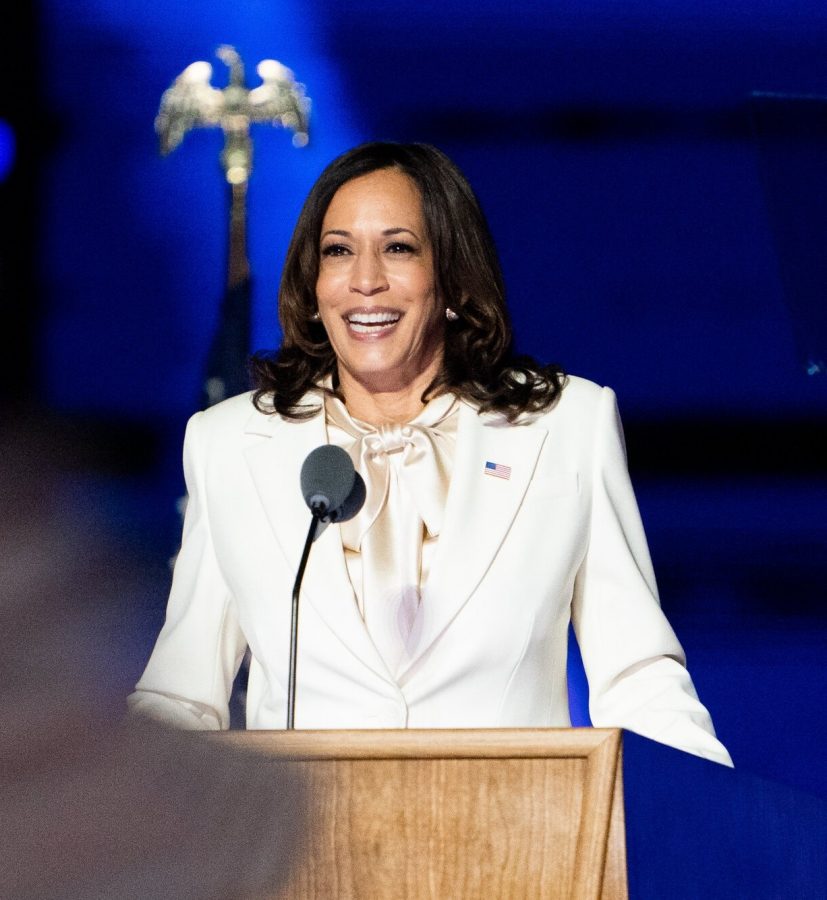Madam Vice President
Representation in politics matters
photo courtesy of New York Times
Vice President-elect Kamala Harris wears suffragette white onstage to give her victory speech, a nod to the official colors of the National Woman’s Party. During her speech, Harris paid homage to the women who came before her: “Tonight, I reflect on their struggle, their determination, and the strength of their vision—to see what can be unburdened by what has been—I stand on their shoulders.”
November 19, 2020
When the winner of the 2020 election was announced, President-elect Joe Biden found himself sharing much of the spotlight with Kamala Harris. The former San Francisco district attorney, California attorney general and California senator was named Biden’s running mate in August. Now, she is the vice president-elect of the United States.
The Biden-Harris ticket made history by winning the election with the most votes ever cast for a U.S. presidential candidate. It made Harris the fourth woman, and the first woman of color, to appear on a major party ticket in the U.S.
Harris is used to making history. When she was elected California’s attorney general in 2010, she became the first female and first Black person to hold the position. She was the second Black woman and the first South Asian American elected to the U.S. Senate when she won in 2016. When she takes office in January, Harris will be the first female vice president, first Black vice president and first Asian American vice president.
Harris’ life leading up to those history-making moments is a picture of the American mosaic. She was born to two immigrants, a mother from India and father from Jamaica. Growing up, she went to both a Black Baptist church and a Hindu temple. She was bussed to elementary school from her lower-middle-class neighborhood as part of school integration efforts. Her parents took her and her younger sister, Maya, to civil rights protests at Berkeley in the 60s and 70s. After high school, she attended a prestigious historically Black university, Howard University, where she joined Alpha Kappa Alpha, a Black sorority. Her experiences growing up during the Civil Rights Movement inspired her to become a prosecutor, and she worked her way to the top seat of California’s judicial system: attorney general. There, she earned a reputation for being progressive in the legal system and determined in the courtroom. These traits helped her earn a spot as a California senator in 2016, and now they will aid her in her role as vice president.
Her story is not the story of a man born into wealth, attending private schools and getting millions of dollars in loans from her father. She is not a businessman turned reality TV star turned politician. She is the child of activists. She is a woman who went to law school, became a prosecutor and worked hard to rise to the top of California’s legal rankings and then entered the political world with that knowledge. Those experiences matter. In a country where, for so long, the people making policy decisions for the entire nation do not share the experiences of most of the nation, we will have a vice president who can bring a new perspective to the White House.
Harris’ motto, a saying from her late mother, is “you may be the first, but make sure you’re not the last.” She repeated those words as she donned the iconic suffragette white onstage to make her victory speech. Harris’ historic role will open up new doors for future female leaders of color, ensuring that she isn’t the last. Data has shown that when women run, they win at about the same rates as men. The problem is that women don’t run as often. This may be because they are less likely to view themselves as qualified, they have less disposable time and income, or they are scared off by the sexist stereotypes and attacks women face when they campaign. Whatever the reason, studies have also shown that when women run, they inspire more women to run in the future. Harris’ high-profile victory will, hopefully, do just that.
It will also help to break down gender stereotypes about female politicians and redefine American leadership, as we have already seen from Harris on the campaign trail. During the vice presidential debate in October, Harris confronted Vice President Mike Pence’s interruptions with the phrase “Mr. Vice President, I’m speaking.” The line struck a chord with many women, who are used to men speaking over them in professional settings. Harris asserted herself with confidence but also with grace. It’s a balancing act many women know too well, of seeming confident but not angry, logical but not unsympathetic, compassionate but not timid. It’s an act Harris will be forced to keep up for the next four years, particularly as a Black woman. Hopefully, she will use it as an opportunity to be an example of what women can do when they are given the chance to lead.
As a multiracial woman, Harris is faced with a unique set of challenges and discrimination. She has been told consistently that she isn’t “Black enough” because of her Indian heritage. She has been faced with people questioning her eligibility for office based on racist claims that she isn’t a U.S. citizen, even though she was born in Oakland. She has dealt with people mispronouncing her name. President Trump has repeatedly mispronounced her name on purpose as an insult, claiming in October that “you have to pronounce it exactly right, otherwise she gets very upset, even though she can’t pronounce it right.” Senator David Perdue mocked her name at a Trump rally, intentionally mispronouncing it and referring to her as “Kamala-mala-mala” before saying “I don’t know, whatever” despite the fact that he has worked with her in the Senate for years. Black women face another layer of insults and stereotypes on top of the racism and sexism that is rampant in politics, which is why it matters that Harris, the first woman elected to such a high office, is a Black woman who understands that.
Young girls, especially Black and brown girls, now have proof of what is possible in America. They watched Harris walk up the stage where she would give her victory speech in her white suit, beaming and waving at the cheering crowd around her. They watched, and they said “that looks like me.” That matters.
As a young woman, Kamala Harris’ victory impacts how I see myself. People have told me my whole life that women can be anything and do anything, and now that claim is finally being fully realized. I hope that future generations and younger girls will grow up in a world where this is the norm, where a woman in a leadership role is an everyday reality and not a once-in-a-lifetime celebration. I also hope that they will grow up in a world where they don’t have to watch men interrupt women during political debates or listen to a crowd cheering as a senator intentionally mispronounces a Black woman’s name.
The work doesn’t stop here, with one woman in the vice presidency. While Congress will have a record number of female representatives in 2021, that number will still sit at less than 30%, a poor excuse for representation in a country where women make up around 51% of the population. Women hold just 23% of mayoral seats, 29% of state assembly seats and 28% of state executive seats. Joe Biden will be the country’s 46th president. Zero of those 46 presidents have been women. Kamala Harris’ victory will not undo systemic racism in the American legal system, shift the racist and sexist culture of workplaces or stop the rising number of hate crimes in the U.S. Everyone in the country needs to work together to accomplish that.
Despite all of this, her victory was a major win for all of America. No matter who you voted for or which side you’re on, we are finally living up to the ideals of equal opportunity and “liberty and justice for all” that are supposed to drive this country. We will see what Harris does in office and how she works to make sure more voices are heard, but for now, we should celebrate this victory. America is finally going to see a Black woman making big decisions in one of the highest offices in the country. We are finally going to see a woman as a leader in the role of the vice presidency.
In the words of Kamala Harris’ niece, Meena Harris, “Madam Vice President sounds pretty damn good.”







